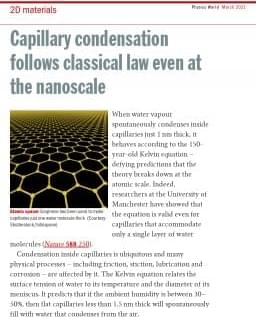When water vapour spontaneously condenses inside capillaries just 1 nm thick, it behaves according to the 150-year-old Kelvin equation – defying predictions that the theory breaks down at the atomic scale. Indeed, researchers at the University of Manchester have showed that the equation is valid even for capillaries that accommodate only a single layer of water molecules (Nature 588 250).
Condensation inside capillaries is ubiquitous and many physical processes – including friction, stiction, lubrication and corrosion – are affected by it. The Kelvin equation relates the surface tension of water to its temperature and the diameter of its meniscus. It predicts that if the ambient humidity is between 30–50%, then flat capillaries less than 1.5 nm thick will spontaneously fill with water that condenses from the air.
Real world capillaries can be even smaller, but for them it is impossible to define the curvature of a liquid’s meniscus so the Kelvin equation should no longer hold. However, because such tight confinement is difficult to achieve in the laboratory, this had yet to be tested.
